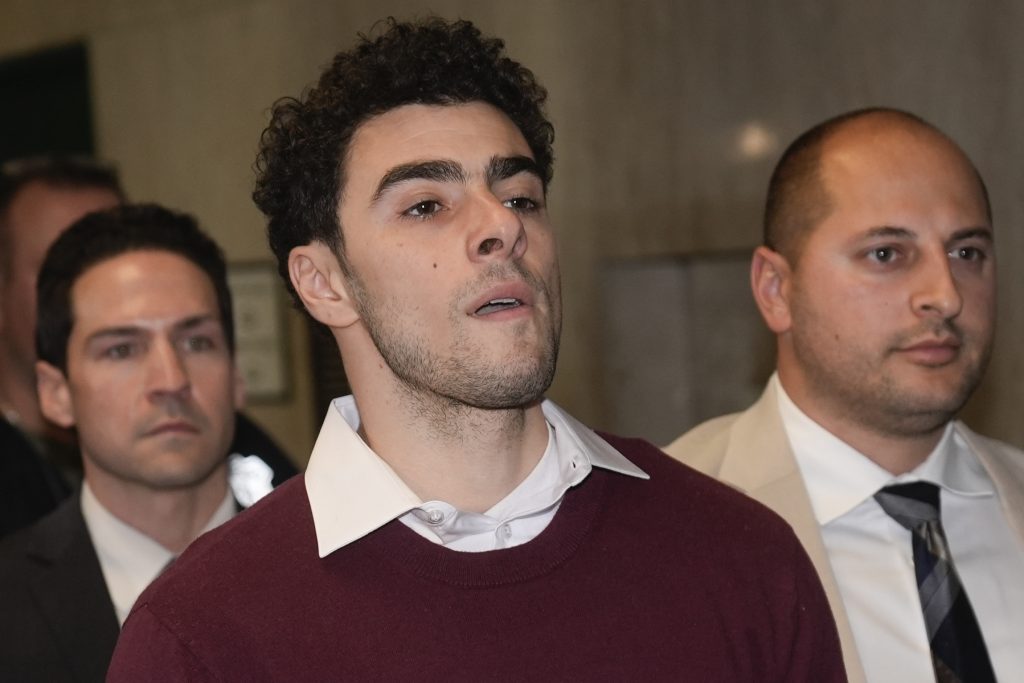The case of Luigi Mangione, the suspect charged with the murder of UnitedHealthcare CEO Brian Thompson, has taken a bizarre turn, transforming from a standard criminal proceeding into a peculiar social media phenomenon. Mangione has garnered an unlikely following online, with some individuals expressing admiration and support for the accused murderer. Videos and images of Mangione, particularly those taken during his court appearances, have circulated widely on platforms like TikTok, garnering hundreds of thousands of views and likes. This unexpected online fandom has manifested in various forms, including the sale of clothing items worn by Mangione during court proceedings. The public display of support reached a new level with a viral video depicting a group of approximately 20 people gathered outside Brooklyn’s Metropolitan Detention Center, ringing bells and banging buckets, seemingly in solidarity with Mangione. This demonstration underscores the unusual nature of the case and the unexpected attention it has attracted.
The burgeoning support for Mangione appears to be fueled by a confluence of factors. Underlying the phenomenon is a palpable anger towards the U.S. private healthcare system, a sentiment that has found an outlet in the Mangione case. Some individuals perceive Mangione as a symbol of resistance against the perceived injustices of the healthcare industry, elevating him to a sort of folk hero status. This sentiment is particularly prevalent online, where discussions about Mangione often intertwine with criticisms of the healthcare system. Beyond the political undertones, Mangione’s relative youth and perceived attractiveness have also contributed to his online popularity, particularly among younger demographics. This unusual combination of factors has created a complex and multifaceted narrative around the case, making it a unique subject of public fascination.
The online presence of Mangione’s supporters is particularly noteworthy. A TikTok account, @kingkashed, has been instrumental in disseminating content related to Mangione, including the video of the demonstration outside the detention center. This account has consistently posted material focusing on Mangione, further amplifying his online presence and contributing to the growth of his following. The account’s frequent posts, often accompanied by captions expressing admiration for Mangione, suggest a dedicated effort to maintain his visibility within the online community. The viral spread of this content, combined with the emergence of other pro-Mangione posts on various platforms, illustrates the effectiveness of social media in shaping public perception and mobilizing support, even in controversial circumstances.
The legal proceedings against Mangione are unfolding against this backdrop of unusual public interest and online support. He faces serious charges, including murder through the use of a firearm, which carries a potential death sentence. Mangione has pleaded not guilty to all charges, both federal and state. His legal team has expressed concerns about the impact of the online fervor on his right to a fair trial, arguing that the public discourse and displays of support could prejudice the jury. The prosecution, on the other hand, is likely to focus on the evidence against Mangione, aiming to secure a conviction despite the unusual public sentiment surrounding the case. The ongoing legal battle is set to be a complex and closely watched affair, navigating the unusual intersection of social media, public opinion, and the justice system.
The reactions to the Mangione case have been varied and often polarized. While some have expressed outright support for the accused, others have condemned the glorification of violence and the apparent disregard for the victim, Brian Thompson, and his family. Law enforcement officials, including New York City Mayor Eric Adams, have emphasized their commitment to justice for Thompson and have praised the efforts that led to Mangione’s arrest. Public figures, such as President-elect Donald Trump, have also weighed in, expressing disapproval of the apparent admiration for Mangione. This divergence of opinions reflects the complex and sensitive nature of the case, highlighting the challenges of balancing freedom of expression with the need to ensure a fair and impartial legal process.
The future of the Luigi Mangione case remains uncertain. Currently held without bail, he awaits his next federal court appearance scheduled for January 18th, followed by a state court appearance on February 21st. The legal proceedings will likely be lengthy and complex, given the severity of the charges and the unusual public attention surrounding the case. The impact of the online support for Mangione on the outcome of the trial remains to be seen. The case presents a unique challenge to the justice system, demanding a careful navigation of the complexities of public opinion, social media influence, and the fundamental principles of a fair trial. The eventual verdict will undoubtedly have significant implications, not only for Mangione but also for the broader discourse surrounding the intersection of social media, celebrity, and the criminal justice system.










